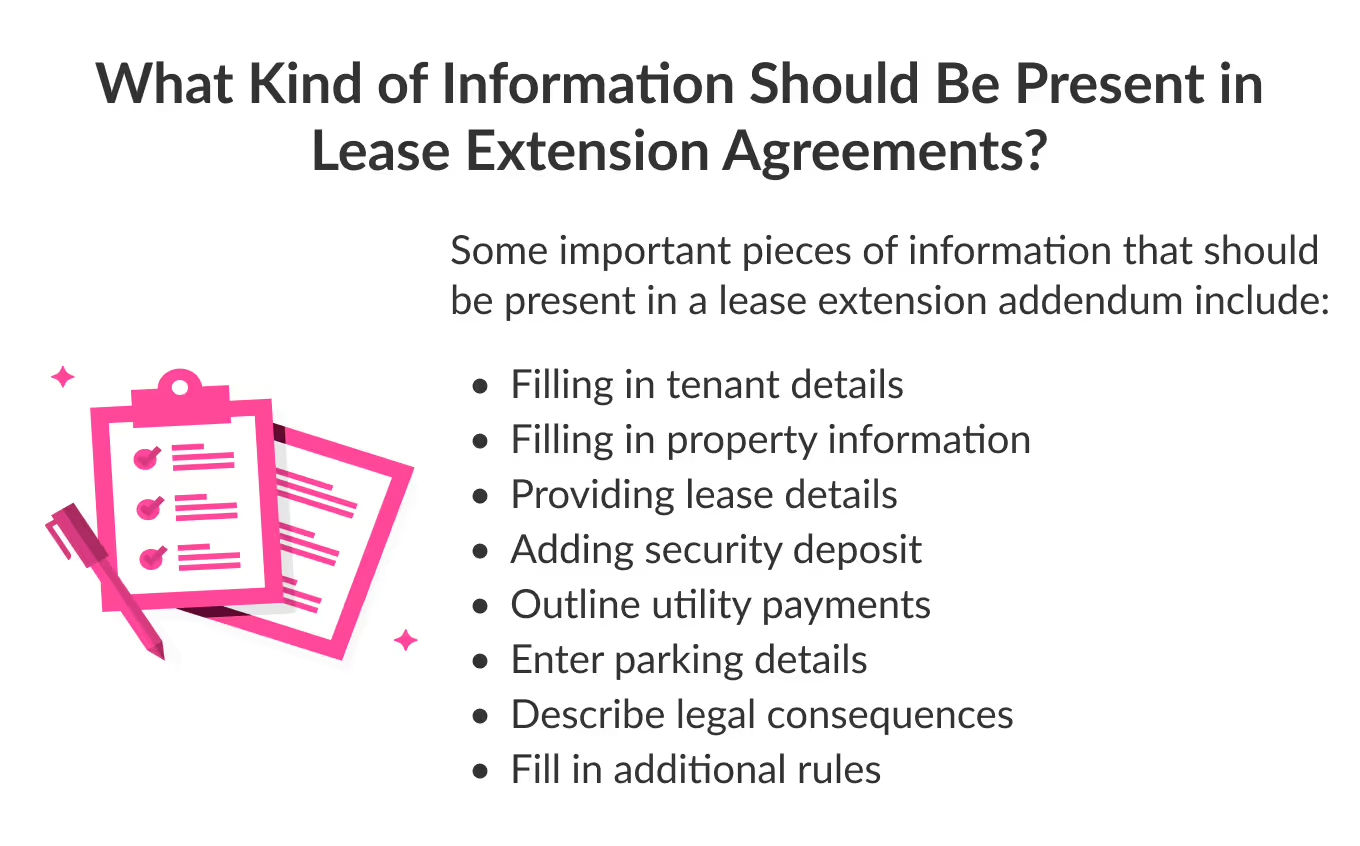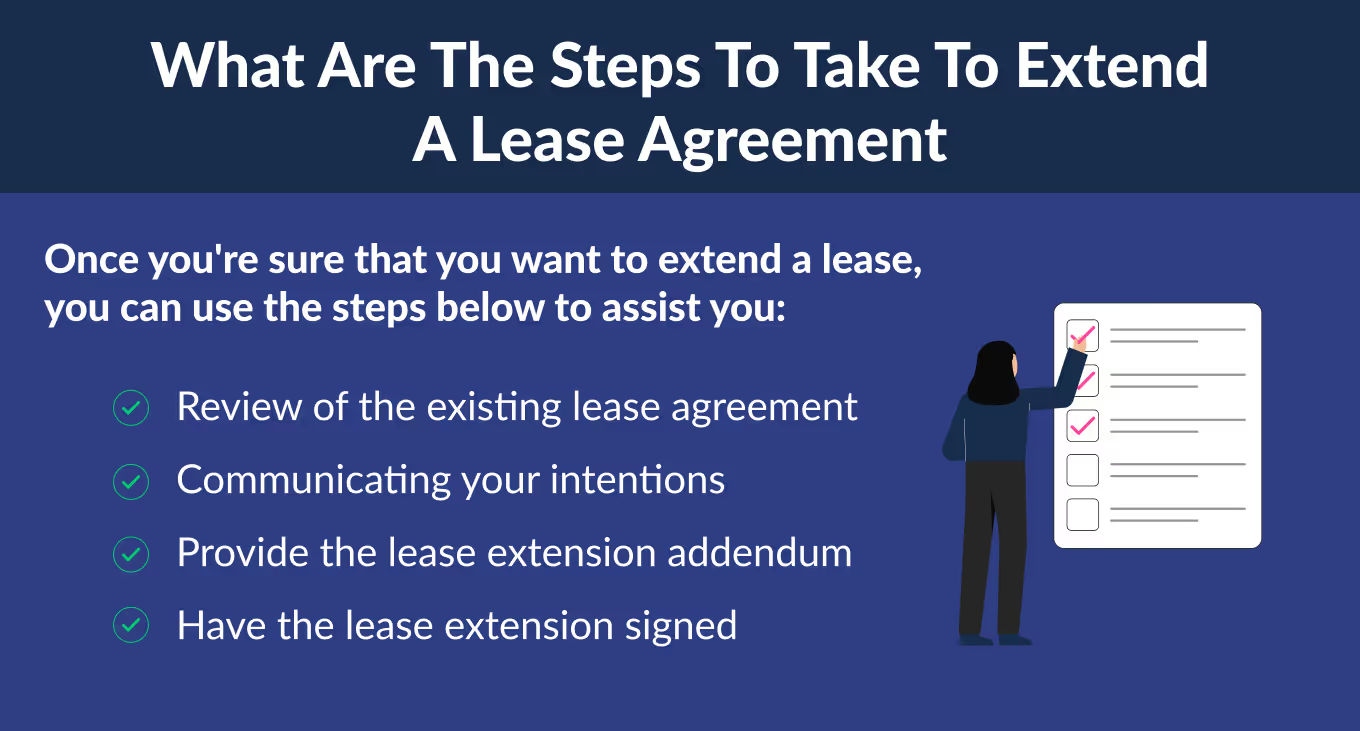When a lease agreement comes to an end, it doesn't necessarily mean that both the landlord and tenant will go their separate ways. Sometimes, a new lease agreement will be established, while in others, the original lease will be extended.
This is where a lease extension addendum comes into play. It is a contract that will be used to extend the original lease agreement. Essentially, there will be a new date set for which the lease expires and both the landlord and tenant will agree to this.
Lease extension agreements do more than just change the end date of the original lease though. They can capture any price changes to the rent. It's not uncommon to see the sum for the monthly rent (or whatever period may apply) increase, especially if the lease agreement is set to expire in a short time.
The lease extension addendum will indicate the new price, while the other provisions of the original lease agreement will stay as is.
For a lease extension agreement to be added to the original lease and enforceable by law, both the landlord and the tenant must sign it.
How Does a Lease Extension Agreement Differ from a Lease Renewal?
For many people, the outcome of lease renewal agreements and lease extension agreements are the same, so there's the question of why there are called two different things. While it's true that both would see a tenant continue to pay rent and stay on the property, the way each is treated is not the same.
This is why it's a good idea to understand the difference so that a rental agreement can proceed in the right way. Here's a quick look at how the two are different.
A lease extension agreement is simply a motion to continue the original lease. In this case, the lease expires, but both the tenant and landlord want to keep the agreement going beyond what was initially meant to be the end date.
While this is still the original lease agreement, there may be different provisions such as the new lease end date or an increase in the rent being paid. There is no interruption to the agreement with an extension as there would be with a lease renewal.
On that note, there's the matter of a lease renewal agreement. Unlike lease extension forms, which are meant to prolong what was to end, documentation for lease renewals is meant for landlords and tenants who wish to renew lease agreements after expiration.
The lease renewal can impose limits on agreements that benefit either party. In a case where the original lease is reassigned, introducing a renewal can also impose limits on whatever remaining liability the tenant has to the landlord.
Additionally, from a legal standpoint, there will be a time slice between the end of the original lease and the beginning of the new lease agreement.
Essentially, if the provisions of the rental agreement are fine as is on both sides, a lease extension agreement would be more appropriate, especially since it cuts out administrative overhead and associated fees.
Note that if a tenant chooses to stay on a property where no lease extension agreement is in place, the person becomes a holdover tenant, with the lease becoming a month-to-month tenancy. This prevents tenants from renegotiating repairs and other property-related provisions, while landlords are prevented from renegotiating the cost of the rent.
What Kind of Information Should Be Present in Lease Extension Agreements?

While some freedom may be exercised over the documentation used for lease extensions, it's recommended that the following be included:
- Names of both the landlord and tenant
- Address of the property
- Addendum date
- Lease extension agreement effective date
- Lease extension agreement end date
- Consequences associated with breaking the lease extension agreement
- Rent to be paid during the lease extension
- Any applicable deposit for the lease extension
- Property care procedures to be applied during the lease extension
- Signatures and associated dates of both the landlord and the tenant
What Are Some Good Use Cases for a Lease Extension Agreement?
Though a lease extension agreement may not have all the bells and whistles of a new lease, it can be incredibly effective in circumstances that are best suited to changing the end date of the existing lease. Some of these are as follows:
- Reducing vacancy
- Keeping tenants in locations that may be difficult to rent
- Reducing the time and money that needs to be spent to continue dealings with the same tenant
- Retaining tenants that the landlord may have developed a fondness for
- Reducing the complications of business relations in the matter
- Changing the end date of the original lease agreement from one that corresponds with a holiday or a special occasion
As you likely realize, this is the easiest way to have a lease agreement continue to run for an established duration. Just ensure that you follow the recommendations above to write it properly since you don't want to deal with unwanted challenges down the road.
What Are Cases in Which Lease Extensions Are Not Recommended?
There are also cases in which a lease extension agreement is not a good idea. A couple of these are:
- Dealing with tenants who have repeatedly breached the existing lease agreement. Even considering the convenient way in which a lease extension continues the existing lease, you don't want to be retaining bad tenants. Allow the lease to expire and attempt to find better tenants.
- A situation in which renovations are needed. Renovations to a property can be problematic if you have people living there. If you want to add value to the location by improving it, the best course of action is to allow the lease to expire so you may do so.
What Are the Right Steps to Take if You Wish to Extend a Lease Agreement?

Once you're sure that you want to extend a lease, you can use the steps below to assist you.
Review of the Existing Lease Agreement
It's always a good idea to review the existing terms that hold. This will include the end date, rent, and other provisions. Take note of anything you may wish to amend for the period of the lease extension. The rent amount is the most common change made to these agreements. Either party may ask for it to be adjusted upward or downward.
Communicating Your Intentions
The landlord's perspective of a tenant's lease experience and desires is not always spot on. That's why it's recommended to reach out to the tenant to see if there is a desire to remain on the rental property. More importantly, find out if the current terms are comfortable or if the person would want new terms.
Provide the Lease Extension Addendum
Lease extension forms are most often mailed or delivered to the tenant. A copy of the original lease agreement should be affixed to the lease addendum, and it will include changes that need to be made. Anything beyond these changes will remain as is.
Have the Lease Extension Form Signed
Once the property owner and the tenant agree to the provisions established, both parties will sign and date same.
Is There a Set Period That Offers for Lease Extensions Must Go on For?
Technically speaking, the landlord is the one who decides this. Perhaps you wish to extend the lease for another year or just a couple of months. There are no imposed limitations here.
It is wise to think about the implications of each term though. Remember that once both parties sign, nothing can be adjusted. Therefore, if you know that you may want to make significant adjustments at a certain point, it wouldn't be a good idea to have the lease extension go beyond whenever that is.
Does Suggesting a Lease Extension Agreement Require the Tenant to Indicate an Interest?
It does not. If you are to wait on the tenant to indicate an interest, you may end up missing the opportunity to continue forward with someone who is genuinely interested but decided to say nothing.
While you do not want to force the lease extension addendum on the tenant, you do want to be clear about your position on the matter if you do want to extend the current provisions. Additionally, if you are adhering to the tips presented above, you would also be taking the time to communicate well enough to understand what the tenant wants too.
Whether you're opting for a residential lease extension or a renewal agreement, understanding where each person stands is invaluable. If nothing else, it means that getting a signature on each side shouldn't be too difficult.
In a Nutshell
A lease extension addendum is a written contract that can be used to extend the existing rental agreement either with the same provisions or with light modifications such as to the price of rent.
It is a good idea to think about what kind of changes would be wanted and other events that could impact the intended dates before putting the idea forward to the tenant. Additionally, you want to take the time to understand what the tenant wants in all of this before you decide to go ahead.
Bear in mind that in some cases, especially those where a series of changes are desired, a lease renewal is the better option.
If you do wish to go the route of a lease extension addendum though, you will want to ensure that your form is capturing the relevant details. For access to a well-designed free lease extension agreement form, alongside a host of other forms landlords will find useful, visit Doorloop's form library here!
Frequently Asked Questions
Can a Tenant Simply Stay on a Property When the Tenancy Ends with No Lease Extension Addendum?
If a tenant does this, then the person will become a holdover tenant. This will convert the lease to a month-to-month tenancy and will impose restrictions on the scope of negotiations that are allowed.
Does a Lease Extension Agreement Need to Preserve the Previously Established Terms?
For the most part, a lease extension addendum will keep the terms of the original lease intact. However, modifications are allowed such as to the amount to be paid in rent.
How Does One Differentiate Between a Lease Renewal Agreement and a Lease Extension Agreement?
A lease extension addendum is meant to simply change the expiration date of an existing agreement, while a lease renewal signals the end of the existing one and the start of a new one.
































.svg)
.svg)

